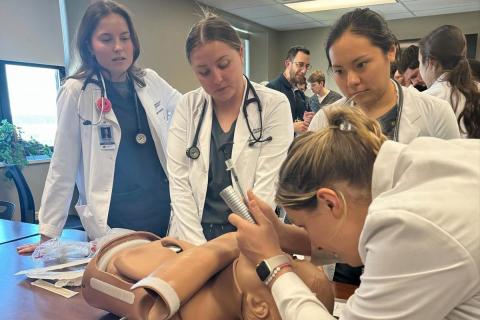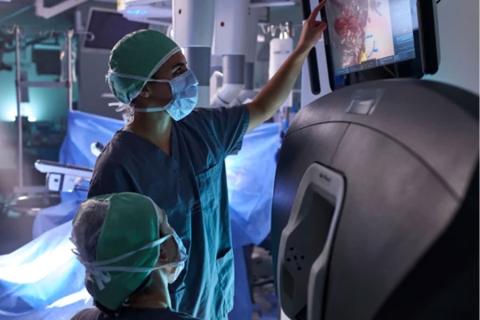Each cohort includes 32 students. Graduates of the RRCC PA program receive a Master’s in Physician Assistant Studies (MPAS). The RRCC PA program has a long history of educating competent, community-minded PAs to practice primary care. Our graduates receive exceptional training and are well-prepared to enter clinical practice upon graduation.
The mission of the RRCC PA Program is to prepare physician assistants to serve all communities by practicing professional, empathetic, inclusive, team-based medicine with a focus on primary care and an emphasis on excellence.
The Program was created in 1998 after several years of needs assessment and after community support was determined to be strong. The first class was admitted in January of 1999; subsequent classes were admitted in August of each year thereafter beginning in 1999
Our accepted students have been successful in careers such as nursing, physical therapy, emergency services, exercise physiology, medical assisting, radiographic technology, respiratory therapy, and audiology, among many others.
Some students hold a master's or doctoral degree; all have a baccalaureate degree prior to acceptance.
Admission to the program is extremely competitive. The average age of each class is between 28 and 30 years old. The RRCC PA Program accepts 32 students per year.
All Info Sessions will be held in a virtual format, Zoom links are found next to the Information Session date. No registration or RSVP is required for attendance.
June 16, 2025: 5:30 - 7:00 p.m.
October 7, 2025: 5:30 - 7:00 p.m.

The Master's curriculum spans a total of 27 months. PA students will earn 120 credits upon graduation.

The 2025 CASPA application cycle is open April 24 - September 1, 2025. Application fees for the 2025 application cycle must be paid by September 15, 2025.

Physician Assistant Program is accredited by the Accreditation Review Commission on Education for the Physician Assistant (ARC-PA).
The Master's curriculum is a 27 month program. PA students will earn 120 credits upon graduation.
All RRCC PA program prerequisites must be acquired at US institutions of higher learning accredited by a DOE recognized agency. The applicant must complete all RRCC PA program prerequisites by September 1, 2025. Prerequisite coursework completed after September 1, 2025 will not be accepted. All prerequisite courses must be completed by the aforementioned deadline; there is no period of time previous to which prerequisites will not be reviewed or accepted, provided they meet Program requirements. All prerequisite courses must be completed with a final grade of 'C' or higher. Prerequisite courses may be completed in an on-line format. Pass/Fail and/or Satisfactory/Unsatisfactory grades will not be accepted for prerequisite courses. Applicants must have a cumulative prerequisite GPA of 3.0 or higher on a 4.0 scale. The admission committee annually reviews program prerequisite course requirements to ensure relevancy and preparedness for academic and professional success. Please note: all specified prerequisite courses are REQUIRED. NO SUBSTITUTIONS OF COURSES WILL BE ACCEPTED.
College Algebra or higher level math for example: Trigonometry and/or Calculus. Advanced Placement or College Level Examination Program (CLEP) is accepted for this prerequisite only. Please note, transcripts must verify AP or CLEP credits are designated/awarded for College Algebra (or higher level math) course. AP or CLEP credits submitted without transcript verification will not be accepted by the RRCC PA Program admission committee. - 3 semester credit hours or 4 quarter credit hours
Allowable from any department - 3 semester credit hours or 4 quarter credit hours
Course must be Algebra or higher level math-based. Must be taken within a physics or math department - 3 semester credit hours or 4 quarter credit hours
Course must be taken within a science department and cannot be substituted by an upper level general biology or microbiology course - 3 semester credit hours or 4 quarter credit hours
Please note: Upper level/division course is necessary to meet the requirement. Typically, these courses have course numbers that begin with 2 (200-level/2000-level) or higher and have a lower level/division prerequisite requirement. Applicants are encouraged to verify courses with the college/university from which they were completed, as/if needed. It is the applicants' responsibility to ensure that all required pre-requisite courses have been completed.
Course must be taken within a science department. Plant-based genetics does not meet this requirement. - 3 semester credit hours or 4 quarter credit hours
Please note: Upper level/division course is necessary to meet the requirement. Typically, these courses have course numbers that begin with 2 (200-level/2000-level) or higher and have a lower level/division prerequisite requirement. Applicants are encouraged to verify courses with the college/university from which they were completed, as/if needed. It is the applicants' responsibility to ensure that all required pre-requisite courses have been completed.
3 semester credit hours/4 quarter credit hours each or combination course of Anatomy/Physiology totaling 6 semester credit hours/8 quarter credit hours
Course must be taken within a science department - 6 semester credit hours or 8 quarter credit hours
Please note: Upper level/division course is necessary to meet the requirement. Typically, these courses have course numbers that begin with 2 (200-level/2000-level) or higher and have a lower level/division prerequisite requirement. Applicants are encouraged to verify courses with the college/university from which they were completed, as/if needed. It is the applicants' responsibility to ensure that all required pre-requisite courses have been completed.
Course must be taken in a chemistry department. 3 semester credit hours or 4 quarter credit hours
Please note: Upper level/division course is necessary to meet the requirement. Typically, these courses have course numbers that begin with 2 (200-level/2000-level) or higher and have a lower level/division prerequisite requirement. Applicants are encouraged to verify courses with the college/university from which they were completed, as/if needed. It is the applicants' responsibility to ensure that all required pre-requisite courses have been completed.
Courses taken as part of a professional program (for example: pharmacy, chiropractic medicine, dentistry) do not fulfill program prerequisites.
Please note that these prerequisites represent the minimum requirements to be considered for admission. Successful applicants (admitted to the program) usually have significant additional science coursework at or above the 200 level equivalent (sophomore level).
Need help finding courses? RRCC offers the above noted prerequisite courses including BIO 2124: Genetics and BIO 2110: Cell Biology. Refer to the RRCC course catalog for more information.
- Demonstration of a depth and breadth of medical knowledge appropriate to deliver safe patient care
- Ability to obtain an organized history by asking appropriate, patient-centered, individualized questions that lead to the development of an accurate and appropriate assessment and plan
- Performance of a physical exam that, by using proper technique, allows the student to further develop the assessment and plan
- Ordering and interpreting labs, imaging, referrals, etc. that consider the individual patient and the risks, benefits, and costs
- Development of a reasonable differential diagnosis
- Reaching an appropriate assessment that is reflective of the evaluation of the patient that does not cause harm, neglect, or death
- Development of a treatment plan that reflects the individual patient’s needs and does not cause harm, neglect, or death
- Performance of clinical skills that is appropriate, effective, and within scope of practice
- Education of patients and their families on wellness, disease, prevention, and treatment plans and ensuring their understanding
- Documentation that is medicolegally truthful and sound and protects both the patient and the provider
- Timely performance of a patient visit that is reflective of a new PA graduate and workplace expectations (15-30 minute office visits as a reference)
- Professional behaviors and skills to include positive rapport, respectful communication, truthfulness, humility, self-reflection, implementation of constructive feedback, recognition of professional boundaries, organization, reliability, and accountability that allow the student to effectively demonstrate self-directed learning and ongoing quality improvement
- Interpersonal skills to include collegial communication, willing acceptance of constructive feedback, active listening, empathy, self-regulation, self-awareness
- Collegial collaboration with other members of the health care team that promotes interprofessional communication and positive patient outcomes
- Practices that protect professional licensure and prevention of disciplinary action such as prescribing practices and preferences and moral and ethical choices
- Approaching all patients with an attitude of respect, inclusivity, cultural humility, and empathetic, active listening
Red Rocks Community College
Physician Assistant Program
10280 West 55th Avenue
Arvada, Colorado 80002
Phone: 303.914.6048
Email: pa.program@rrcc.edu
The Physician Assistant Program is located at the RRCC Arvada Campus.
We are open Monday through Friday, 9 a.m. to 4 p.m.




